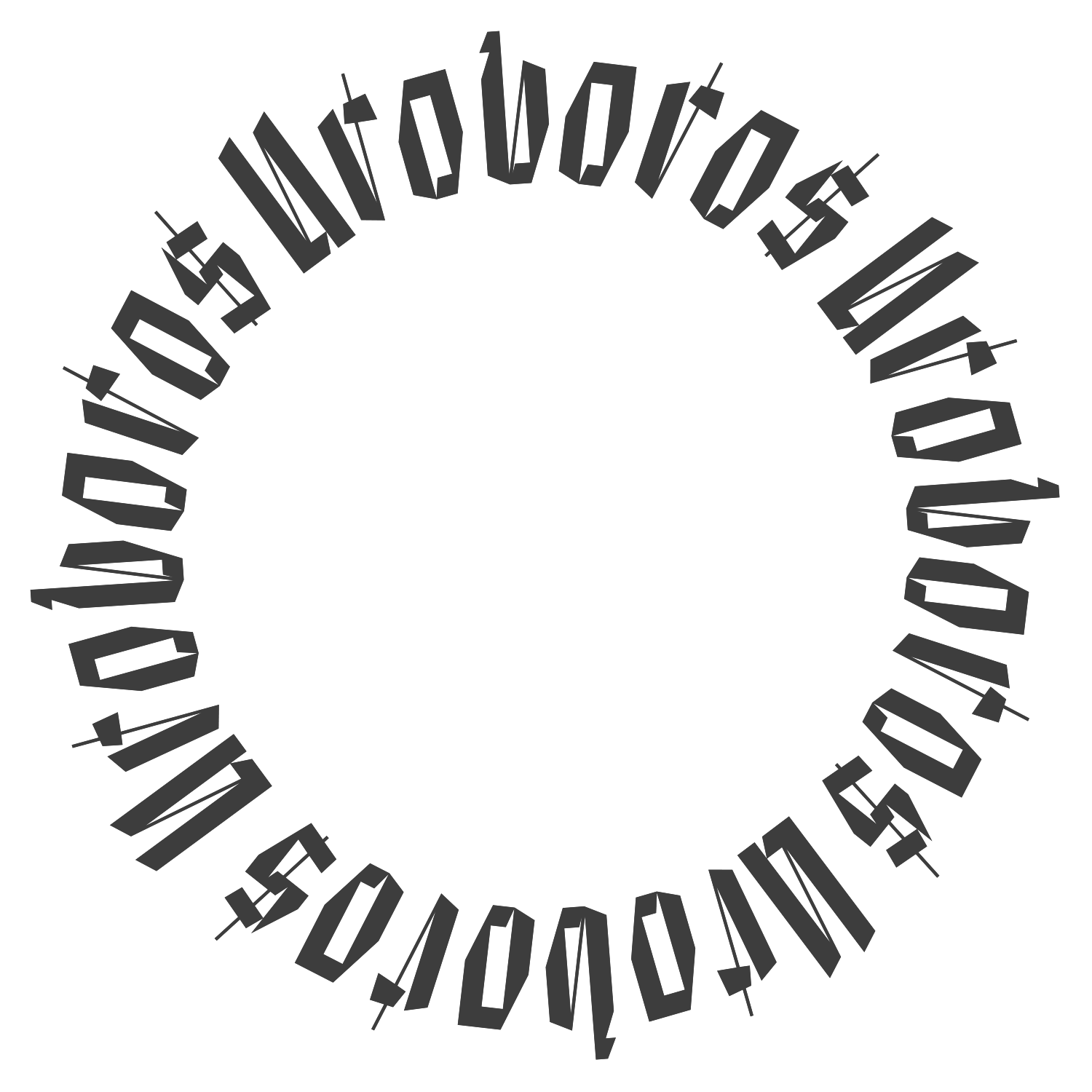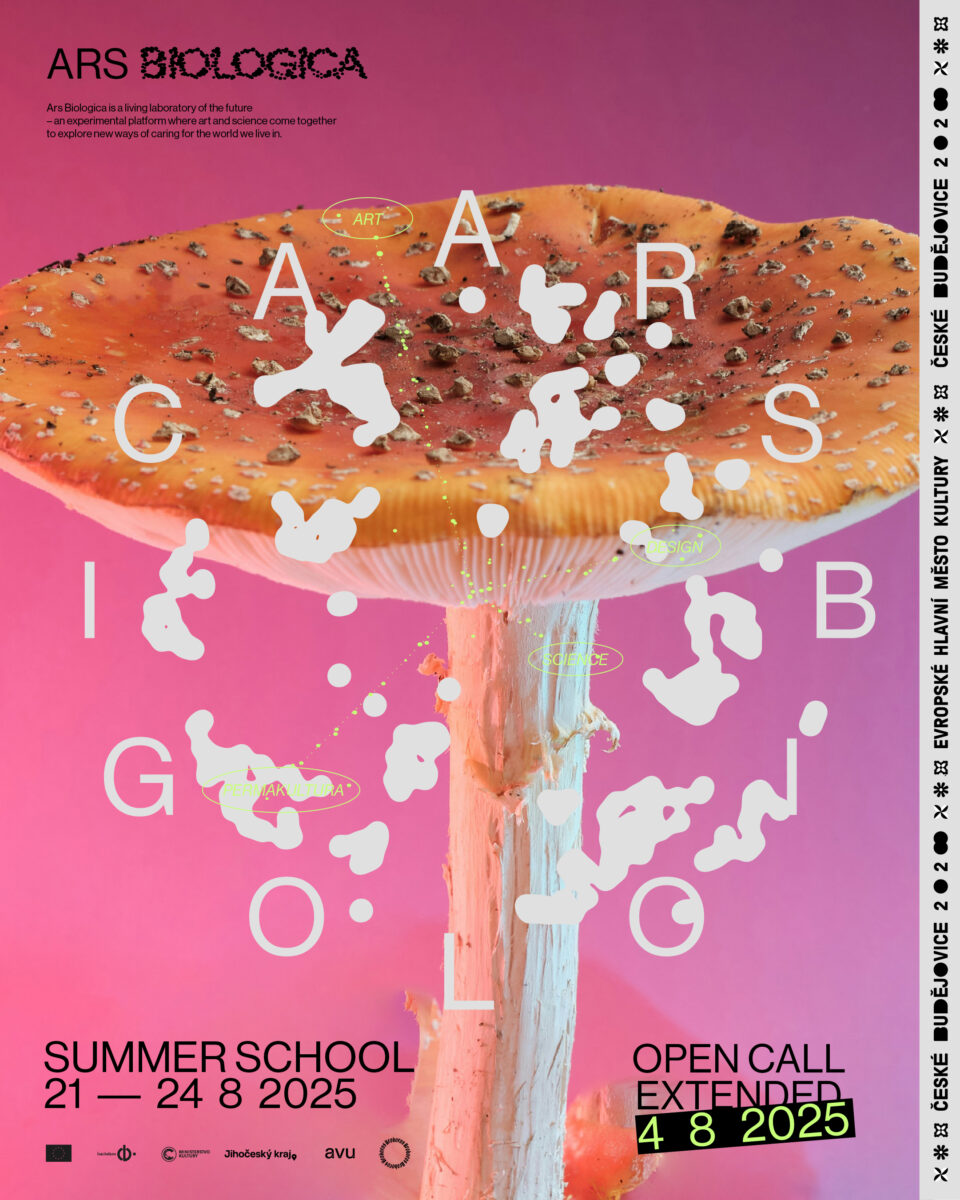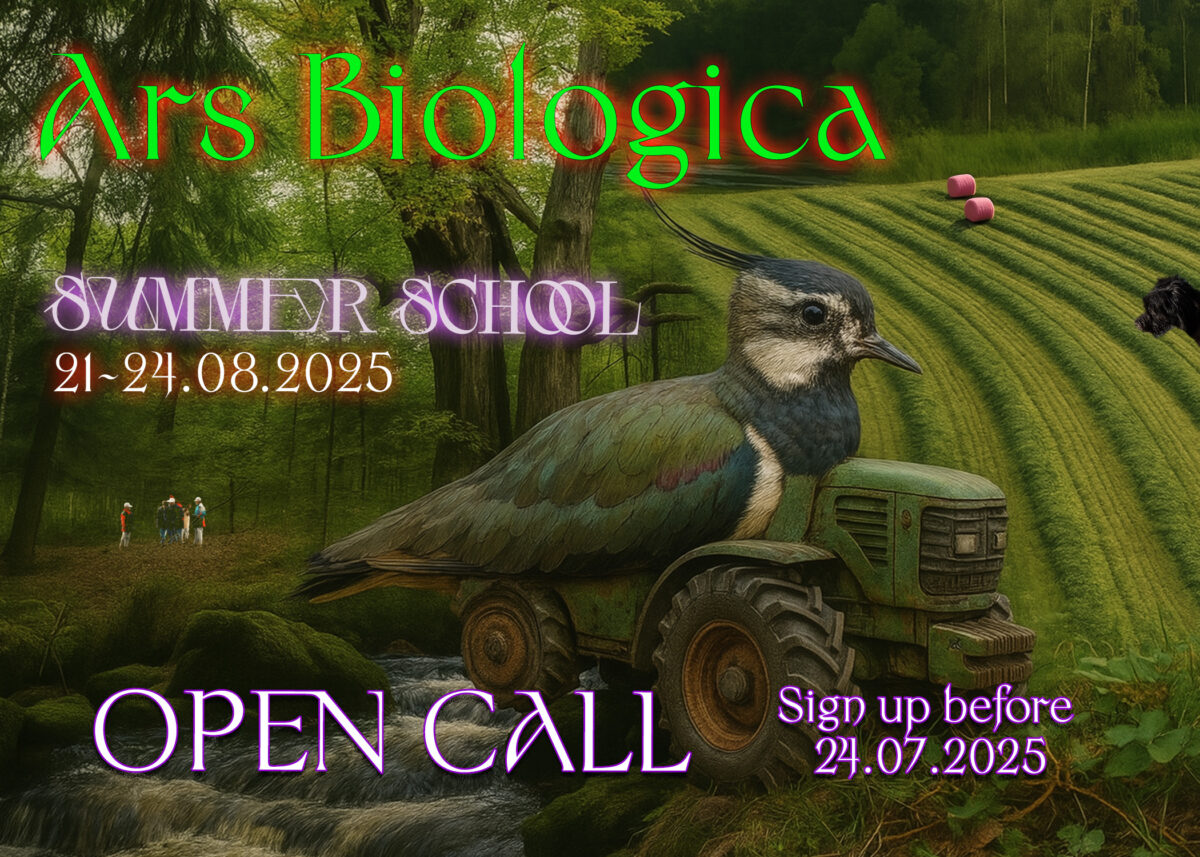
Open Call :: Ars Biologica Summer School 2025
21-24 July (Prague) and 21-24 August 2025 (Budweis).


(letní škola – popis události v čestině se nachází zde)
ARS BIOLOGICA is an international transdisciplinary platform connecting experimental art, design, technology and science with a focus on permaculture thinking and practice. The project forms one of the main pillars of the Budweis European Capital of Culture 2028 and involves artist residencies, an independent study program, an annual symposium and other events, culminating in the Ars Biologica festival in 2028.
This year, the Ars Biologica Independent Study Program (ABIS) features a four-day summer school inviting artists, designers, researchers, scientists and students interested in transdisciplinary exploration of permacultural concepts and practices. The summer school is structured into four thematic tracks and includes a diverse program of workshops, lectures, filed trips, and co-creative research sessions inspired by permacultural principles—such as valuing small and slow solutions, integrating rather than segregating, cultivating diversity, or responding creatively to change.
The summer school takes place in Budweis (České Budějovice) from 21–24 August (Tracks 2-4) and in Prague from 21–24 July (Track 1). On 24 August, all participants will gather in Budweis at the Ars Biologica Pavilion 2025, held as part of the Země Živitelka Fair. The Pavilion will provide a space for sharing experiences from the summer school as well as ideas for future collaboration.
The main partners of the Ars Biologica summer school are the Uroboros Collective, the Academy of Fine Arts in Prague (AVU), and the Technical University of Liberec (TUL).
To participate at the summer school, please apply via the Open Call links below.
Thematic tracks
(see details of each track below)
#1 PermaPrompting with Feral (AI)gents (July 2025, Prague – held in English)
Open Call for Track 1 (Application Deadline: 26. 6. 2025)
#2 Permacultural thinking in multispecies research (August 2025, Budweis – held in Czech/English, flexibly, depending on accepted participants)
#3 Permacomputing and Digital Infrastructures (August 2025, Budweis – held in Czech/English, flexibly, depending on accepted participants)
#4 Pomalé obvody (August 2025, Budweis – held in Czech)
Open call for Tracks 2-4 (Application Deadline: 4. 8 2025)
Things to Note
- All summer school tracks are organised as in-person events.
- Participation is free of charge, but accommodation and travel expenses are covered by participants themselves. The organisers can assist in finding affordable accommodation (the daily program begins at 10:00, making it possible to commute from other cities).
- The summer school process will be presented at the Ars Biologica Pavilion organised as part of the Země Živitelka fair. All participants will receive free entry to the event.
- Coffee breaks will be provided throughout the program. Lunch is arranged individually by participants.
- The languages of Summer School are Czech and English (see details under each Track description).
- Participants from all disciplines and backgrounds are warmly welcomed to join.
Tracks in Detail:
Track #1: PermaPrompting with Feral (AI)gents
Time & Place: 21–24 July 2025, Prague – AVU Veletržní Hall
Tutors: Enrique Encinas, Ramón Alvarado, Andrej Boleslavský, Markéta Dolejšová, Jana Bernartová, Zdeňka Němcová, Lenka Hámošová, Štěpán Kleník & Artur Magrot
AI prompting – the act of shaping how machine learning systems like ChatGPT generate content – is becoming a widespread everyday practice for creativity and connection but also control, exclusion, manipulation and environmental devastation. In light of the disruptive presence of AI tools, how do we build literacy around their inner workings and develop collective strategies that challenge proprietary infrastructures? Machine learning use, transform or refuse?
Co-organised by the Ars Biologica Independent Study Program (ABIS) of the Budweis – European Capital of Culture 2028, the Academy of Fine Arts Prague’s (AVU) Doctoral Research Department, and the Uroboros collective, this 4-day summer school invites artists, designers, researchers, and students of varied backgrounds to experiment with co-creative approaches to prompting and building AI agents. Taking permaculture principles as a critical and generative framework, we will explore whether everyday human–AI interactions can be reimagined through the lenses of interdependence and contextual sensitivity, rather than personal efficiency and scale.
Program:
Monday 21 July (12:00-18:00)
12:00 – 12:15 – Intro to the summerschool theme
12:15 – 13:15 – Keynote by Ramón Alvarado “What is an Agent?”
13:15 – 13:30 – Break
13:30 – 15:30 – Ways of Prompting
System Prompts w/ADA
User Prompts (TBD)
15:30 – 16:00 – Break
16:00 – 18:00 – Ideation Workshop and group formation
Tuesday 22 July (10:00-18:00)
10:00 – 13:00 – Crafting AI Agents session #1 – workshop designing and coding AI agents with different tools
13:00 – 14:00 – Break
14:00 – 16:00 – Crafting AI Agents session #2 – workshop designing and coding AI agents with various tools
16:00 -18:00 – Presentations and discussion
Wednesday 23 July (10:00-18:00)
Activating agents through diverse embodied and performative activities to explore their agency.
10:00 – 13:00 – Embodied Experiments #1 – workshop with different data, bodies and AI Agents
13:00 – 14:00 – Break
14:00 – 16:00 – Embodied Experiments #2 – workshop with different data, bodies and AI Agents
16:00 -18:00 – Presentations and discussion
Thursday 24 July (12:00-18:00) – Perma?PromptFest
Activities open to the public where the summer school agents interact with audiences and each other through micro-events such as:
– Social Prompting sessions
– Machine Quarrels
– Agentic Theater Plays
– Ambient agent Orchestra(tion)
Track #2: Perma~cultural Thinking in Multispecies Research
Time & Place: 21–24 August 2025, Budweis
Tutors: Markéta Dolejšová, Tereza Stehlíková, Tamara Spalajković, Michal Hořejší, Filip Holub, Eva Semančíková, Kluk
The summer school track Perma~cultural Thinking in Multispecies Research invites participants from across art, design, and science to co-creatively explore multispecies relations and tensions shaping the landscapes in and around them. During the four-day collaborative process, we will begin by mapping various methodological approaches, tools, and ways of knowing and doing used in multispecies research. Through experimental fieldwork in the Kluk forest and other local wilderness (including a city, a garden, an agro-festival Země Živitelka), we will then explore how these approaches might complement and support each other—or, conversely, conflict and interfere. Working both intuitively and analytically, sensorially and verbally, spontaneously and systematically, we will explore various methods of gathering and interpreting multispecies experiences and data. Our point of departure will be permacultural practices and principles (including their problems), which will be considered as a critical lens to engage with multispecies inquiries and ways of relating. To document and capture our collaborative process, we will use our sensory perception, observations, memories, shared stories, and other media. This collected data will feed into the making of an Almanac of Multispecies Research—an open-access fanzine publication offering insights into how we might cultivate interdisciplinary sensitivity in multispecies oriented research.
Program:
Monday 21 August (12:00–19:00) — Introductions & Mapping
Location: EHMK main building (Nádražní 118/6, 370 01 České Budějovice)
- 12:00–12:30 — Welcome and introduction to the summer school
- 12:30–14:00 — Introductions of participants and their practice
- 14:00–14:15 — Break
- 14:15–15:45 — Lecture and discussion: Making sense of multispecies research
- 15:45–16:00 — Break
- 16:00–19:00 — Workshop: collective mapping of methods
Tuesday 22 August (9:00–18:00) — Forest Fieldwork & Reflection
Location: Kluk forest (group travels together by train) + EHMK main building (Nádražní 118/6, 370 01 České Budějovice)
- 9:00 — meeting at České Budějovice main train station (train leaves 9:10)
- 10:00–16:00 — research walk with Kluk and collective experimentation with selected methods from Day 1 (bring your own lunch/snack)
- 16:00–18:00 — Reflection on gathered experiences and materials, discussion on possible formats and aims of the Almanac
23 August (10:00–18:00) — Sensing & Archiving
Location: EHMK main building (Nádražní 118/6, 370 01 České Budějovice) + garden at Stecher’s Mill (Pomalé Obvody track’s space)
- 10:00–11:00 — Sharing session: Feral Archiving
- 11:00–14:00 — Almanac, co-creation of the first paper-prototype (breaks as needed)
- 14:00–16:00 — Lunch & walk to the Stecher’s Mill garden
- 16:00–17:00 — Performative experiment: Multispecies sensing
- 17:00–22:00 — Shared dinner for all summer school tracks
24 August (11:00–18:00) — Ars Biologica Pavilion
Location: Země Živitelka fair, České Budějovice Exhibition grounds – Pavilon R2 (Husova třída 523/30, České Budějovice)
- 11:00–12:00 Short presentation of activities within the four summer school tracks at the Ars Biologica Pavilion (Země živitelka fair)
- 12:30–18:00 – Země živitelka: joint exploration of the local terrain, collecting insights for the Almanac
Track #3: Permacomputing and Digital Infrastructures
Time & Place: 21–24 August 2025, Budweis
Tutors: Michal Kučerák & invited guest contributors
For the most part, digital infrastructures are invisible, abstract systems that silently fuel society’s day-to-day operations, from cloud storage to global networks. Permacultural thinking provides an alternative lens that focuses on sustainability, resilience, and profound interconnectedness between systems and the ecological and social arenas in which they are embedded. Applying these principles to digital technology promotes decentralization, energy awareness, repairable systems and local expression. Instead of speed and infinite scale, it is about regenerative cycles, deliberate pace and mutual adjustment.
A powerful biological analogy for us to follow is found in the mycelial network of mushrooms – a subterranean, decentralized network that serves forest ecosystems by exchanging nutrients, communicating and collaborating with trees. Like fungi, any digital systems based on permacultural principles would be networked, adaptable, and symbiotic. They would prioritize longevity over novelty, ecosystem health over the extraction, and care over control. These are systems with an aesthetic of organic roughness, an embrace of imperfection, an ethic of resourcefulness, of material consciousness.
In this environment, concepts behind permacomputing are not simply a design strategies but co-produce space for a “mycological imagination”, where digital tools are grown like crops, integrated into particular ecologies, and nurtured through collective care. This view makes space for us to think again about technology not as an industrial mechanism, but as a part of a living, relational web in which, code, soil, data, spores and microbes co-evolve.
Program (in progress)
Monday 21 August (12:00-19:00)
12:00–12:30 — Welcome and introduction to the summer school
12:30 – 15:00 — Group introduction
16:00 – 19:00 — Tutors presentations
Tuesday 22 August (10:00-18:00)
10:00 -18:00 — Země Živitelka fair research trip
Wednesday 23 August (10:00-19:00)
10:00 – 13:00 — Ideation
13:00 – 14:00 — Lunch
14:00 – 18:00 — Final sprint & reflection
18:30–22:00 — Common dinner at a garden colony opposite the Stecherův mlýn
Thursday 24 August (time TBC) — Ars Biologica Pavilion
Short summary presentations of activities from the four thematic summer school tracks at the Ars Biologica Pavilion (Země Živitelka Fair, Výstaviště České Budějovice)
Sekce #4: Pomalé obvody (CZ only / POUZE v češtině)
Čas a místo: 21-24. 8 2025, České Budějovice a zahrádkářská kolonie naproti Stecherovu mlýnu
Lektorstvo: Nikola Brabcová / Janek Rous / Karin Šrubařová / Michal Kindernay / MAK / mobilní architektonická kancelář / Slavomíra Ondrušová / Hana Šantrůčková / Aliaksandra Yakubouskaya
Jak mohou kolektivní a procesuální formy poznání proměnit způsoby, jimiž vnímáme a utváříme svět? Co se odehrává na rozhraní vědeckých metod a umělecké zkušenosti? Jak lze prostředí vnímat skrze kombinaci smyslového a kognitivního zkoumání?
Setkání v zahradě u řeky vytváří prostor pro společnou zkušenost vnímání a zkoumání místa jako citlivého živého systému — na pomezí ekosystému města a otevřené krajiny. Permakulturní proces zde slouží jako výzkumný rámec a společně strávený čas se stává metodou.
Zahrada se přirozeně rozšiřuje do okolní krajiny, stejně jako se rozplývají hranice mezi věděním, praxí a prožitkem. Vzniká tak prostor pro pomalé, místně a tělesně situované učení, které dává prostor i tomu, co bývá přehlíženo nebo zůstává neviditelné.
Letní škola propojuje vědecké a umělecké přístupy s kolektivní zkušeností dočasného obydlení prostoru. Čekají nás odborné procházky, pozorování, naslouchání zvukovým krajinám i destilace vůní. Budeme sbírat rostliny, kreslit, vytvářet dočasnou architekturu společného zázemí, která se stane součástí zahrady, vařit a hledat formy sdíleného poznání skrze dialog a zaznamenávání souvislostí.
V prostředí, kde všechno roste, se budeme učit vnímat půdu jako živý organismus, představovat si její vztah s rostlinami, proudění živin a energetickou výměnu. Staneme se součástí jemné rovnováhy místa a krajiny.
Program
21.8 (14:00-19:00) Úvod a společné seznámení
- 12:00 – 12:30 úvodní uvítání na letní škole (+ přesun na Secherův Mlýn)
- 14:00 – 15:00 sraz a procházka k jezu Rožnov
- 15:00 – 16:00 úvod a představení programu
- 17:00 – 19:00 přesun do zahrady a příprava večeře a base campu
22.8 (10:00-20:00) Přednáška, workshop, destilace vůní, koncert
- 10:00 – 11:00 dopolední rozcvička
- 11:00 – 12:30 přednáška a diskuze s Hanou Šantrůčkovou / O půdě a koloběhu prvků
- 13:00 – 14:00 oběd
- 14:00 – 15:30 workshop se Slavomírou Ondrušovou / Kresba jako poznámkový aparát
- 16:00 – 18:00 sběr bylin a destilace vůní
- 18:00 – 19:00 večeře
- 19:00 – 20:00 koncert Michal Kindernay
23.8 (10:00-22:00) Workshop zahradní architektury, společné čtení, performance
- 10:00 – 12:00 Architektonická kancelář MAK – workshop zahradní architektury
- 12:00 – 13:00 oběd
- 13:00 – 16:00 workshop MAK – pokračování
- 16:00 – 17:00 společné čtení
- 17:00 – 19:00 příprava večeře
- 19:00 – 21:00 Aliaksandra Yakubouskaya / performance
- 21:00 – 22:00 oheň
24.8 – Ars Biologica Pavilon
- Krátké shrnutí aktivit v rámci 4 tematických sekcí letní školy v Ars Biologica Pavilonu (Země živitelka veletrh, Výstaviště České Budějovice)